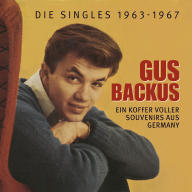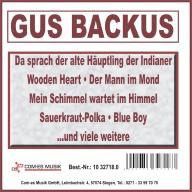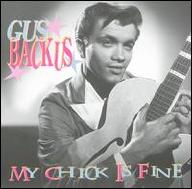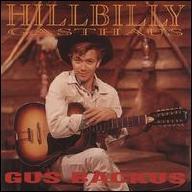He was still in uniform when he founded a singing group called the Vidells, who found some limited popularity among military audiences, but weren't permitted to perform off of their base. Backus left the group behind but remained in Germany, where he married and settled down. He was offered chance to record from Polydor Records and made his debut for the label during the early summer of 1959 with German-language versions of Lloyd Price's "Have You Ever Had the Blues" and the Elvis Presley hit "A Fool Such as I." Neither of these sides was a success, In July 1960, he suddenly struck a chord with German audiences with a short string of huge German-language hits -- the single "Brauner Bar und Weisse Taube" was Backus' breakthrough hit, and he followed it up with two more singles, "Da Sprach der Alte Hauptling" and "Der Mann im Mond." Unfortunately, what passed for rock & roll in Germany in those days wasn't too different in character or quality from the brand of teen pop that Americans endured in the late '50s. Backus' voice was fine, and he might've been a slightly heavier competitor to Ricky Nelson, but his records, apart from the presence of an electric rhythm guitar or bass here and there, were mostly lightly orchestrated pop that happened to be sung by a younger man. "Queen of the Stars," the English-language version of "Der Mann im Mond" (i.e. "The Man in the Moon"), is a pleasantly catchy singalong number that might've been a great Spotniks vocal track, while "Listen" could've been a good post-1961-vintage Everly Brothers-style harmony number. In 1961, Backus released his first English-language single in Germany, "Priscilla," which had been a hit for Eddie Cooley five years before. It failed to chart as highly as his previous singles. Backus remained a huge recording star in Germany and was sufficiently well-known as a presence in central Europe.
By 1962, almost as a reflection of the peculiarly international nature of Backus' life and work, he began pursuing international audiences, with records such as "Happy End in Switzerland" and "Vaya con Dios." He cut records in New York and in Nashville and was making solid rock & roll-style music, doing songs by John D. Loudermilk ("Short on Love"), Boudleaux Bryant ("Big Willie Broke Jail Tonight"), and Mort Shuman ("Turn Around"), which were released in Germany. He remained a pop music phenomenon in Germany for most of the '60s. Backus did embrace the changes taking place in rock music in England and America, cutting sides that were pretty credible British Invasion-era rock & roll, some pop psychedelia, and even some folk-rock-inspired work, along with a few songs ("Touch on Your Heart") that might've given Gary Lewis the Playboys a run for their money. Backus ceased recording in English after 1967, but remained a European star and a vocalist of popularity in Germany, akin to the level enjoyed by Cliff Richard in England. He left behind enough singles to fill three CDs without overlap, in idioms ranging from hardcore rockabilly and mainstream rock & roll to hillbilly-style pop/rock, to brassy big-band-type pop/rock and early Euro-pop. Backus continued to perform in Germany until he retired in 2014. He died at his home in Gemering, not far from Munich, on February 21, 2019; he was 81 years old. ~ Bruce Eder, Rovi

















